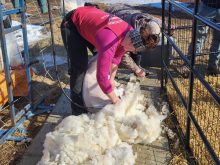CALGARY – While some of Alberta Agriculture’s field trials were less than stellar this spring, some good was gained.
A cool, wet spring in southern Alberta showed how bad weather can affect a variety of plants.
Diseases like root rot showed up among sun-loving lentils scattered in plots on co-operating farmers’ fields across the south. Other plants like peas have thrived.
Beata Lees, special crops specialist at Lethbridge, said such perceived failures have value. Farmers considering adding special crops to their rotations can see the good with the bad
Read Also

Charges laid after cattle theft
Saskatchewan RCMP lay two charges against a man after six cattle went missing.
“If they just know about the positive side and not the down side of some of these crops, it can bias your decision making,” she said.
For many prairie farmers field peas, lentils and canary seed are becoming part of their regular rotations.
Although these crops are designated as special, they are no longer regarded as exotic or in need of special care. They offer high yields and quick cash, saving many farmers from the economic doldrums their wheat-only growing colleagues have suffered in the last 10 years.
“The farmers that have adopted special crops in their cropping rotations in the last 10 years are all doing well. It’s really helped them diversify their farming income. It’s offered them good cash flow versus the traditional wheat and barley guy,” Lees said.
Besides the variety of crops available, researchers are looking at how best to plant these different crops and finding the right machines to do the job.
Some of the test plots are farmed under conventional practices while others are planted in residue-covered fields using direct seeding equipment. Seeding some of these crops with no-till hoe drills can lead to problems. Large seeds like lentils, sunflowers or peas don’t move down the spouts properly or are cracked open by the force of air from the drill.
“Peas are very popular (with farmers) but a lot of the equipment has to be fine-tuned and worked on to handle the different sizes of peas,” Lees said.
However, peas do well in no-till situations because extra trash on the field keeps the soil cool and moist.
Crops like sunflowers and corn are being adapted to no-till farming, she said. Others may continue to be planted into well-tilled soil. Carrots, for example, must be in a soft, well-worked bed so roots don’t become forked. Otherwise consumers won’t buy them.

















